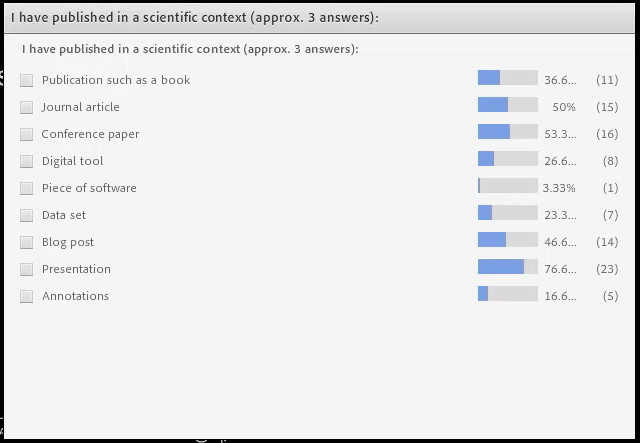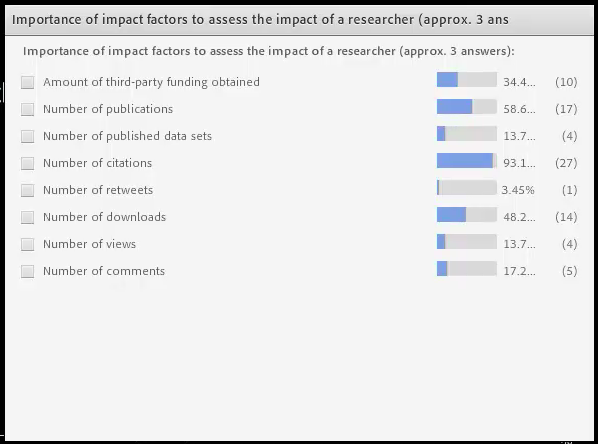Wrap Up & Materials of PARTHENOS eHumanities and eHeritage Webinar Series Webinar: Create Impact with your eHumanities and eHeritage Research
written by Ulrike Wuttke, Juliane Stiller, Klaus Thoden (18.02.2018)
Trainers: Dr. Juliane Stiller (Humboldt-University Berlin) and Klaus Thoden, M.A. (Max Planck Institute for the History of Science), Moderator: Ulrike Wuttke (University of Applied Sciences Potsdam),
Date and Time: Thursday, 08.02.2018, 11:00 – 12:00 A.M. CET
Materials
- View the slide set on SlideShare (PDF).
- Download the slide set from HAL (PDF).
- Download the slide set from Zenodo (PPTX).
- Watch the webinar recording on the PARTHENOS YouTube Channel.
- Watch the interactive webinar recording via Adobe Connect.
Wrap Up
This PARTHENOS webinar was dedicated to the topic of creating impact with eHumanities and eHeritage research, taking into account specific infrastructural aspects (Read the full description of this webinar). The webinar was quickly fully booked. It attracted participants from all over Europe (Germany, Croatia, Switzerland, England, Italy, France, Ireland, Netherlands, Serbia, Greece, Sweden, Estonia) as well as from the U.S., Australia and South Africa. Participants were mainly Digital Humanities Researchers, but also Cultural Heritage Practitioners, Developers and managers and policy makers joined in. Participants declared in advance of the webinar to have mainly an intermediate and beginners familiarity of digital research infrastructures.
The topic was insightfully discussed by Juliane and Klaus from several perspectives, including the basics of research measurement and research metrics, repositories, new publication types and new forms of dissemination and challenges posed by data and software citation.
Especially interesting were the results of the two polls Juliane and Klaus put to the participants. The first poll asked the participants which kind of publications they have already published in a scientific context. The most chosen answer here was “Presentation” (76,6%), followed by “Conference Paper” (53,3%) and “Blog Post” (46,6%). The second poll asked for the importance of impact factors to assess the impact of a researcher. The most frequent answer here was “Number of citations” (93.1%), followed by “Number of Publications” (58,6%) and “Number of Downloads” (48,2%).

Results Poll 1: Publishing in Scientific Context

Results Poll 2: Importance of Impact Factors
At the end of their presentation Juliane and Klaus introduced the Impactomatrix as a tool for drafting an impact-oriented publication and dissemination strategy.
The webinar was concluded with three takeaway messages:
- How, when and what we publish changes
- New and enhanced publication forms require new dissemination strategies
- Understanding the impact of your research output will increase your visibility and success
Last but not least, Juliane and Klaus kindly invited all participants to join the impact workshop: Measuring Change in Digital Humanities: Workshop on Impact Factors and Success Criteria. Berlin School of Library and Information Science, Humboldt-Universität zu Berlin, 21-22 June 2018.
Summary of the Question & Answer Session
After Juliane and Klaus had given their presentation the participants were invited to submit their question to the webinar trainers who answered them live. This discussion explored several new aspects and is summarized below, including the most important links:
Question: Jeff was concerned about the sustainability of websites, which he considered great for research outputs, he therefore asked for recommendations for how to sustain research sites after the project money expires.
Klaus explained about issues around archiving web pages and recommended to use HTML for archiving. Another possibility is using virtual machines, for this you need to find a host (a service offered by DARIAH). He ended with the advice to stick to standard technology and standard file formats to store these data. Juliane added that the loss of these research outputs is very annoying. She welcomes that this problem is being realized and addressed by research funders and the European commission by asking for Data Management Plans that go beyond the projects’ lifetime.
Question: Frank was wondering whether new methods of dissemination aren’t just as relevant for traditional means of publication (e.g. twittering about a traditional journal publication), rather than them being mostly relevant to new publication methods (twittering about a GitHub package).
Juliane: Dissemination applies to all forms of research output: you can use new forms of dissemination for traditional outputs and vice versa. You have to take into account your audience and choose the channel accordingly. Klaus: The most important aspect is getting across your research.
Question: Rahul was inquiring if there is any development to work on domain based impact factors. He referred to a Dutch newspaper article by the president of NIOD, which like in many of the humanities disciplines, writing a book is the norm.
Juliane thanked Rahul for this information, but was not aware of domain specific impact factors (e.g. only for Digital Humanities) and set the question out to the participants. Rahul sent to me as a follow up the link to an English website for a humanities focused impact measurement system QRiH. He described QRiH as an instrument for describing, systematically, quality and relevance in humanities research in the Netherlands. Thanks, Rahul!
Question: Daniela asked for advice how (traditional) libraries should approach collect and facilitate dissemination of new forms of publication.
Juliane: This is also a question for policy makers. If research libraries, that used to collect printed materials now also have to collect code (such as GitHub repositories) that will confront them with problems, they would need a new infrastructure. Klaus: This is the point where often research infrastructures take over, they collect this kind of data and offer search interfaces, libraries can then turn back to them to discover the data.
Question: Jim & Timlynn asked if PARTHENOS has a specific policy or program aspect to address the needs and interests in eResearch for independent #CitizenScientists who tend to be seen as the “crowd” for nameless/faceless tasks.
This question could not be answered fully during the webinar, but was answered after the webinar by Frank Uiterwaal from PARTHENOS. Frank answered that “independent ‘Citizen Scientists’ should benefit from what we as PARTHENOS are doing, just as much as scholars within universities and or cultural heritage institutes. As PARTHENOS, we advocate Open Access (in line with the FAIR principles) on many occasion. While, still, (DH) independent scholars in general might find it hard to gain access to some scientific material – both primary and secondary sources – we are encouraging the creation of a non-exclusive ‘playing field’ in Humanities science. We also practice what we preach, as the tools we create are accessible to all, both to independent and to affiliated researchers.”
Read also the PARTHENOS News Item about this webinar.
Image Credits:
Featured Image: “Sceenshot Webinar Stiller Thoden”

